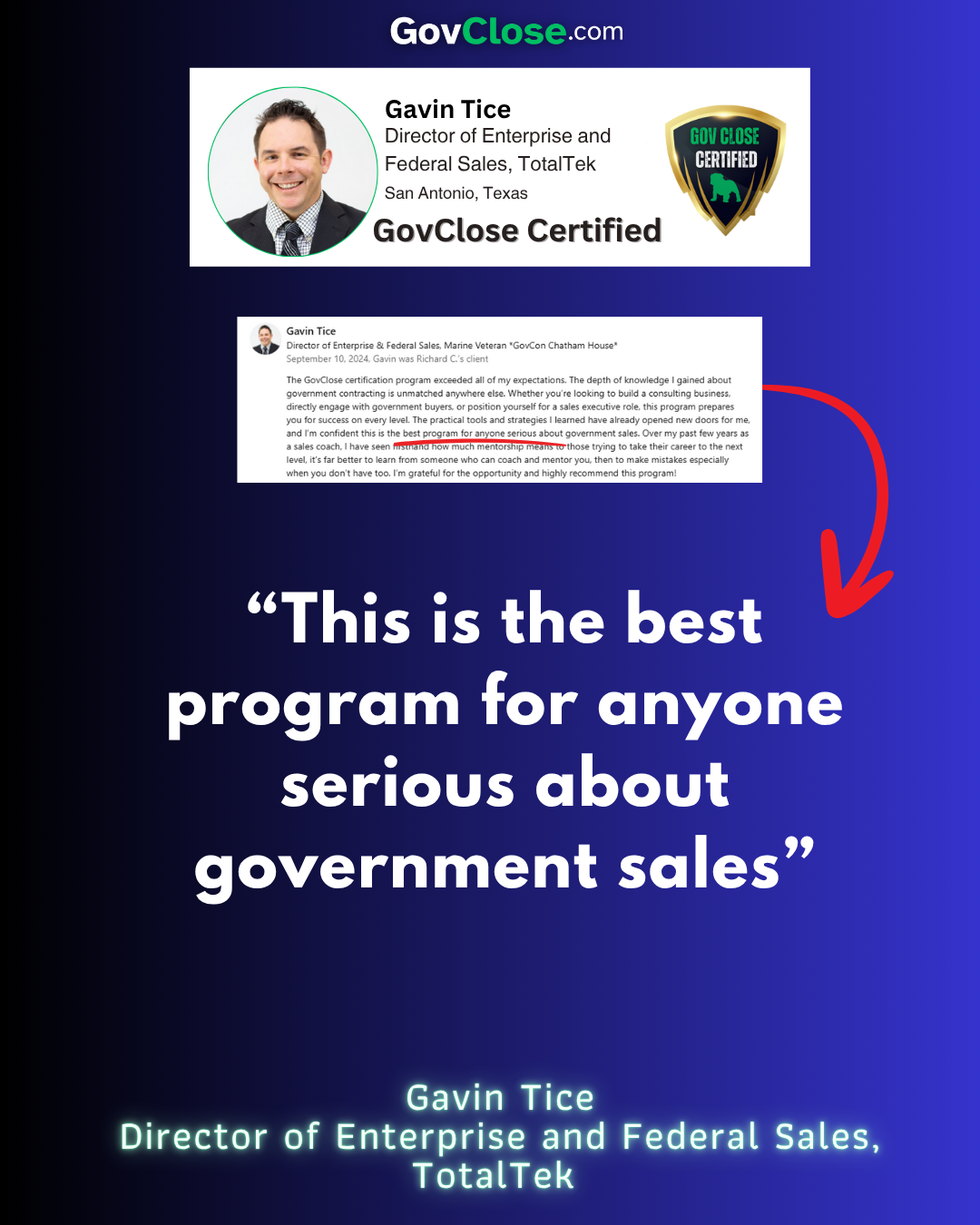
Are Government Contracts Rigged? (Podcast Transcript)
Aug 28, 2022[01:08] Richard C. Howard: Hey, guys, thanks for tuning into the Government Sales Momentum podcast video. I'm Richard Howard. Today we're covering a topic that a lot of my clients and consulting clients have brought up, especially if they've been selling to the government for a while, are trying to, and if they're frustrated, often they'll make a comment, this looks like it's rigged. Our government contracts look like they're rigged, or just, our competitors have such an advantage, how can we break in there? So the short answer is, no, they're not rigged. There are thousands of pages of regulations and laws that prevent that type of thing and punish those that do try to do something illicit or try to influence in an illegal way. But from a small business perspective, especially if you're new to the federal marketplace, it can definitely appear that there is some type of unfair advantage or some underhanded dealing going on. And there are a few reasons small businesses may think that, right?
So I've talked to over a couple of hundred companies in our consulting practice, and here are some of the comments that they will bring to me. Hey, we're writing proposals all the time and we're not winning anything. Or, hey, it looks like the same companies are winning over and over again, or your direct competitor seems like they're winning. Or for a company that's really paying attention to the details of what the solicitations look like, they'll say things like, hey, it looks like this request for proposal, request for, quote, was written for our competitor. Looks like it was written for exactly what they do, the certifications they have, the technologies they have. How is that possible? And they're winning it. This is rigged. So why does it appear that way? Why is that happening? Well, the first thing, there's really two things going on there, but it all comes down to your strategy and how you're approaching the federal marketplace. So these companies that are winning over and over again, they're really just copying what the big defense and government contractors are doing and have been doing for decades. And this isn't really written anywhere. It's not published that this is what you're supposed to be doing, but they're all doing it and it's perfectly legal. And it comes down to the fact that they're not engaging with the government for the first time when an RFP comes out. So if you're seeing an RFP or an RFQ drop on Sam.gov, or if you're on a GSA contract and you're getting sent solicitations that you could potentially bid on, if that's the first time you're engaging with the government, your odds of success are extremely, extremely low. Not saying you can't win, right.
You can't predict everything that's going to come out. At some point you're going to see an RFP or an RFQ that looks like it's perfect for your company. And if you think you have a relationship with the organization or just you're such a good fit, that makes sense for you to put your proposal together, go ahead. But what companies are doing is they're identifying opportunities six months a year out, sometimes for especially larger projects years in advance, establishing relationships with those offices and then influencing requirements. Right. So let's talk about the RFP solicitation that you saw come, out. Looks like it was written for your competitor and then they win. It has to be rigged, right? No. So in fact, what probably happened there, and this happens all the time, is six months, a year before that solicitation ever came out, and there was probably a request for information where sources saw it. Now your competitors, I guarantee, are responding to those. Now all companies aren't responding to RFIs and sources sought, but the smart ones are. And when they respond to something like that, there aren't a lot of rules governing that the way that an RFP it is with an RFP. So if a request for proposal comes out, you are bound by what they're asking for. And it's very specific. You need to submit everything on time.
You have to really pay attention to the details and be thorough and really not only answering what the request for proposal is asking for, but really hitting the nuance of what you think the organization needs. But when we're talking about an RFI source, the government's phishing for information, they're trying to figure out how to get that solicitation out there. Can it be set aside for a small business? What are the requirements going to be? Because remember, the contracting officers and program managers aren't the experts in your field, right? If it's a solicitation for construction or building a satellite or whatever it is, you're the expert at that if that's what you provide. And so they're looking for requirements. They're looking for are you a veteran owned small businesswoman on small business. Can they even make this a small business set aside? Does it need to be competed for everyone? How many people are actually responding to this? Like how many people out there? How many companies can actually respond and put a proposal in? If it's only one company, then that might indicate to the government that this needs to be a sole source contract for the one company that does this one thing. Now your competitor sees this RFI for, I'm going to say satellite building just for the sake of the podcast here. And what they're doing is they're answering the questions, hey, maybe timelines, contract recommendations, there might be some specific questions about the technology. But in addition to that, what they're doing is they are suggesting requirements and probably writing to them, as they would appear in the Solicitation itself saying, hey, we recommend these types of certifications and you better believe they're recommending the certifications that their company holds. We recommend that this technology be put into the satellite that you are wanting to build. Again, everything they're recommending is going to be what that company does specifically. And their goal, your competitor’s goal, is to push you out of the equation. They want to make sure that the requirements that appear in that Solicitation are so specific to what they do that they're eliminating competition. And further, if they have a set aside, if they happen to be a, we'll say a veteran owned small business, you better believe they are recommending to the government that they set this aside for a veteran owned small business. What does that do? Well, that eliminates everybody else. It's not a veteran owned small business if it actually comes out to be that set aside. Some other things they might recommend if they're using a GSA contract to sell to the government. Or maybe they're on one of the big GWACs, right? Like maybe they're on NASA Sewp or CIOSP Three or whatever it is they might recommend to the government, hey, for ease of use, we're on this contract vehicle, we recommend that you use this contracting mechanism to put companies on contract.
Now what happens, let's say it's NASA Sewp and they've convinced not only the requirements that are going to be in the Solicitation. So not only have they influenced that, but they've also recommended that it's going to be on NASA Sewp. So when the RFP comes out and you're seeing it for the first time, you see first of all, a bunch of requirements that are very specific to your competitor. You're like, oh, that looks like it was written for them. And then the caveat, we intend to award this on NASA S Sewp and you're not on NASA Sewp. Well now you're out of the game, right? If you want to go after that opportunity, you need to partner with a company that's on NASA Sewp. So you can see that you can influence dramatically the requirements that are going to go into something like this. Additionally, these companies are always trying to set up meetings with the program management team that's associated with the effort. So, very common, a company may set up a meeting before or after an RFI response to discuss the details, to let the program management team know about the company and to learn, like, hey, what is really the details of your problem set that you're trying to solve? So instead of guessing, you can get the RFI, the sources sought, some of the published information, and set up a meeting with the PM. And now you're really going to have an in depth understanding of what the problem that is for the government, and you can make a valid attempt at trying to solve that, and you're just going to increase your odds dramatically of actually winning that contract. So, in essence, government contracts, they're not rigged for the most part, but there's some gray area as far as how you can influence them, right? So you just want to do that legally. And I absolutely recommend talking to a lawyer if you're getting involved with government sales, government contracting, because there are a lot of regulations and laws about how you sell in the federal marketplace and what's allowed and what's not allowed that don't exist commercially in BTB or BTC sales. So hopefully that was helpful. Government sales are not rigged, but there is a tremendous amount of gray area and a whole strategy that companies that are successfully doing this to influence in a legal way the solicitation. So when they come out, they're just going to be set up for a greater degree of success. All right, thanks for listening. Feel free to reach out. We're at DoD Contract Academy
[10:23] Richard C. Howard: I hope you enjoyed this episode of Government Sales Momentum. If you did enjoy the episode, please subscribe to the podcast and leave a review. It's very much appreciated. If you're interested in selling products and services to the Department of Defense, I have something for you that you're not going to find anywhere else in the world. The team and I created a program that takes everything you need to win defense contracts and put it into one place. Up until now, only large defense companies and a small amount of people in the know have had access to how products and services are really sold to the Department of Defense. I've taken all of that information and put it in a step-by-step training module that shows you how to consistently sell to the US. Military. If you join our membership, not only do you get the model, but you get weekly sessions with former DOD acquisitions officers for training and guidance to answer your questions and a community of like-minded business owners that want to partner on different opportunities to bid for subcontracting and teaming or just to discuss general strategy on how to sell to the DOD you'll have access to every course I've created. Every coaching session I've ever recorded in every interview with an acquisition professional that I've ever conducted. And we cover topics that range from defense sales planning and competitor analysis to SBIR and STTR foreign military sales. The list goes on. Go to Dodcontract.com if you are interested, and I would love to see you in the membership. Thanks.
If you enjoyed this article, check out our interview with former contracting officers Col (ret) Louis Orndorff!
Turn Government Contracting Knowledge Into Income
This isn’t a course. It’s a certification and implementation system to help you build a consulting business, land a high-paying sales role, or scale your own company in federal contracting.
We hate SPAM. We will never sell your information, for any reason.


